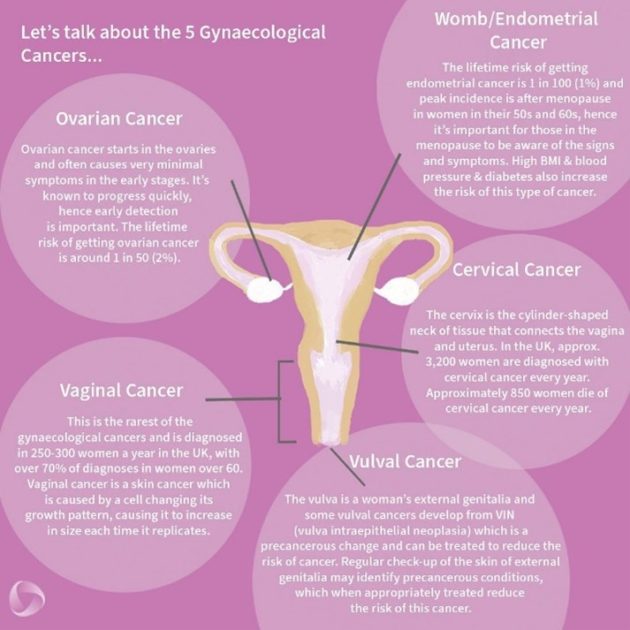
Symptoms of gynaecological cancer you shouldn’t ignore.
September is Gynaecological Cancer Awareness Month (GCAM), so time for us to shine a spotlight on it.
September is Gynaecological Cancer Awareness Month and womens gynaecological organs include womb, cervix, fallopian tube/ovary, vagina and vulva.
Every year, more than 21,000 women in the UK are diagnosed with a gynaecological cancer – however circa. 95% of women with symptoms will not have a gynaecological cancer. This means 60 people receive this life-changing news each and every day. Although the likelihood of having a gynaecological cancer diagnosis is low, it is crucial to recognise symptoms and to understand what is normal for you.
Womens Health recently invited Mr Narendra Pisal and Mr Saurabh Phadnis, our consultant gynaecologists here at London Gynaecology, to discuss about the symptoms and ‘red flags’ you should never ignore when it comes to your vulva.
Symptoms of gynaecological cancer you shouldn’t ignore
Abnormal bleeding/discharge
Any type of abnormal bleeding should be investigated, but bleeding between periods, bleeding after intercourse or post-menopausal bleeding could be a sign of cervical or uterine cancer and can occur with other gynaecological cancers as well. These symptoms should be investigated without delay.
Lumps, bumps & ulcers
Vulval cancers often present as lumps and bumps or ulcers which are easily felt without searching, so you may feel something unusual whilst going to the toilet or during daily activities such as walking and sitting. If your lump is persistent and won’t go away it’s time to get it checked out.
Persistent itching
Persistent itching ‘down below’ could be a sign of thrush, but without the accompanying symptoms could be a pre-cancerous sign of vulval cancers. This may also present as tenderness of the vulva, pain or burning sensation.
Abdominal bloating / distention
We all have our days of feeling bloated, especially at certain times during our cycle, but if you feel constantly bloated or have tummy distention (where the tummy is visibly bigger) then this may be a sign of ovarian cancer. Some women with these symptoms describe that they can’t fit into their jeans or trousers, but they haven’t noticed any weight gain, in fact there may be weight loss.
New onset of abdominal pain
As women we are all used to a bit of tummy pain, but after the age of 45, a new onset of abdominal pain could be a sign of ovarian cancer and medical attention should be sought. Before the age of 45, abdominal pain is more likely to be an infection, or other gynaecological issue such as endometriosis, which also needs a GP assessment.
Other gynaecological symptoms you shouldn’t ignore
Whilst the following symptoms may not indicate cancer, these symptoms can sometimes be significant and — though they aren’t necessarily cause for major concern — are worth seeking early advice on.
Sudden onset of lower abdominal pain
In young women, acute and severe lower abdominal pain can have many causes. They can include important ones such as an ectopic pregnancy (tubal pregnancy) and ovarian cyst complications. Always do a pregnancy test to rule out an ectopic pregnancy and see your doctor for an assessment.
Heavy and painful periods
Heavy or painful periods can sometimes be caused by conditions such as fibroids and endometriosis. Whilst these conditions are not life-threatening, they can affect the quality of life in a major way. Seeking medical attention and early diagnosis can help with planning an appropriate treatment pathway.
Urinary frequency and stinging
An increase in the need to urinate, and stinging when doing, so can indicate a bladder infection and can be easily ruled out or treated. But these symptoms can sometimes indicate a pelvic mass such as a fibroid uterus or an ovarian cyst.
Urinary leakage or incontinence
Urinary leakage or incontinence is a common symptom in women and as many as 40% of women suffer from it particularly after childbirth and menopause. Simple measures such as physiotherapy with pelvic floor exercises can make a huge difference.
Pain during sex
Pain during intercourse can indicate conditions such as endometriosis, and if persistent, you should seek medical attention.
Acute onset of vulval blisters and sores (ulceration)
Sores, yellowish copious vaginal discharge, pelvic pain and bleeding after intercourse can sometimes indicate a sexually transmitted infection. It is always a good idea to get a sexual health check ticked off before embarking on a new relationship.
Symptoms of menopause
Symptoms of menopause such as hot flushes, night sweats, poor quality of sleep, anxiety and mood swings can affect your work and life in a major way. Hormone replacement therapy can be useful and there are also other nutritional and non-medical ways of helping these symptoms.
How long can you have cervical cancer without knowing?
Cervical cancer is a very rare consequence of a common viral infection known as human papilloma virus (HPV). 80% of men and women get HPV infection at some stage in their life and most would shake it off through their own immunity. HPV can be acquired through sex, but can also be transmitted by intimate genital contact.
The time interval between getting the HPV infection and development of cervical cancer is approximately 15 years. This gives plenty of time for prevention through smear tests. If women undergo routine and regular smears, HPV infection and precancerous lesions can be easily detected and treated, thus effectively preventing cancer.
The biggest risk factor for cervical cancer is not having a smear test and remaining unaware of the development of the pre-cancer.
It is therefore important that women see their GP, gynaecologist or practice nurse if they have any of the symptoms mentioned above. Book an appointment today if you have any concerns click here.



